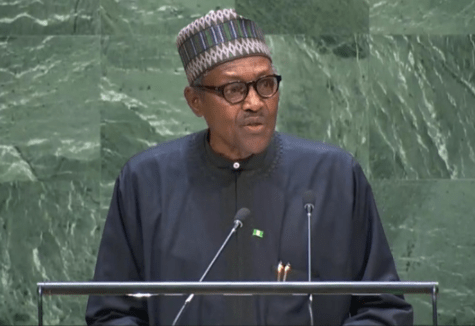
President Muhammadu Buhari has restated the commitment of his administration to eliminate all forms of corruption in all sectors of the economy, urging Nigerians to join in the fight against the social menace.
President Buhari spoke at a one-day summit to mark the United Nations International Anti-Corruption Day with the theme, “Zero Tolerance for Corruption in the Maritime Sector”, organized by the agencies of the Federal Minister of Transportation in collaboration with the Economic and Financial Crimes Commission (EFCC) at the Banquet Hall, Presidential Villa, Abuja, on Monday.
Represented at the event by the Minister of Police Affairs, Muhammadu Maigari, Buhari said the summit is in line with the focus of his administration to block leakages and to improve transparency in all sectors, stating that the country cannot move forward if corruption is not fought to a standstill.
President Buhari, who described the maritime sector as a critical artery of the economy, commended the EFCC, the Nigerian Shippers Council, and other agencies of the transport sector for coming up with the summit, which he said would help enthrone transparency and accountability in the industry.
He said, “I view this summit as a step in the right direction. This initiative complements the various programmes being implemented by this administration to block leakages and to improve transparency in all sectors aimed at boosting revenues in critical areas of the Nigerian economy.
“The theme of this summit, ‘Zero tolerance for Corruption’, gives impetus to one of the cardinal focus of my administration, which is eradicating all forms of corruption in all sectors. Achieving this objective is necessary for the development and progress of Nigeria. We cannot as a country move forward if corruption is not fought to a standstill.
“It is no exaggeration to state that the maritime and transport industry is pivotal to the growth of the economy of any country. It is critical to the ease of doing business. It is in realization of this that my administration has over the last four years embarked on reforms of the economy and the benefits are already visible for all.”
The Minister of State for Transportation, Sen. Gbemisola Saraki, commended President Buhari, for providing political leadership with the war on corruption being one of the topmost priorities of his administration.
While noting efforts of the ministry to tackle corruption at the port, Saraki said the ministry, through its maritime agencies, have initiated and implemented standard operating procedures, which have remained valuable tools not only in the ease of doing business but also help minimize the influx of human contact and corrupt practices at the port.
She, however, noted that there is still room for improvement, as according to her, corruption is one of the nation’s biggest problems, hence the collaboration with EFCC and other anti-corruption agencies.
The Acting Chairman of EFCC, Ibrahim Magu, said corruption has become endemic in the maritime industry, hence the reason it is focusing attention on the sector with the support of agencies of the transport ministry.
“We are looking at fighting corruption in all the sectors but the emphasis today is on the maritime/transport sector. There is a lot of corruption in the maritime industry, so we need to address it. It has become systematic and endemic. So we want to select those sectors that we find very notorious and partner with them,” he said.
While highlighting the achievements recorded by the commission in its fight against corruption, Magu said between January to November, 2019, EFCC secured 1,070 convictions while 244 trucks were forfeited to the Federal Government owing to illegal oil bunkering activities.
Earlier in his address, Executive Secretary of Nigerian Shippers’ Council, Hassan Bello, said the maritime and transport sector is an important sector of the economy that needs to be free from corruption.
Bello said to rid the sector off corrupt practices, there is need for audit of all the various agencies, while also putting in place robust technology. This, he said, would help eliminate delays associated with human contact at the ports.
“We want an audit of our various agencies. We have to subject ourselves so that we see that there is no corruption internally and also in dealing with the private sector or the operators. So we have to partner with all the anti-corruption agencies including EFCC, ICPC and others so that we are conscious.
“One of the things to do to get rid of corruption is deployment of appropriate technology. The moment you have that technology, it would be transparent, faster and eliminate human interface. That is what we are trying to do,” he said.
Highlight of the summit, which kicked off with a road walk, was the launch of the EFCC book, ‘Curbing Electoral Spending’.